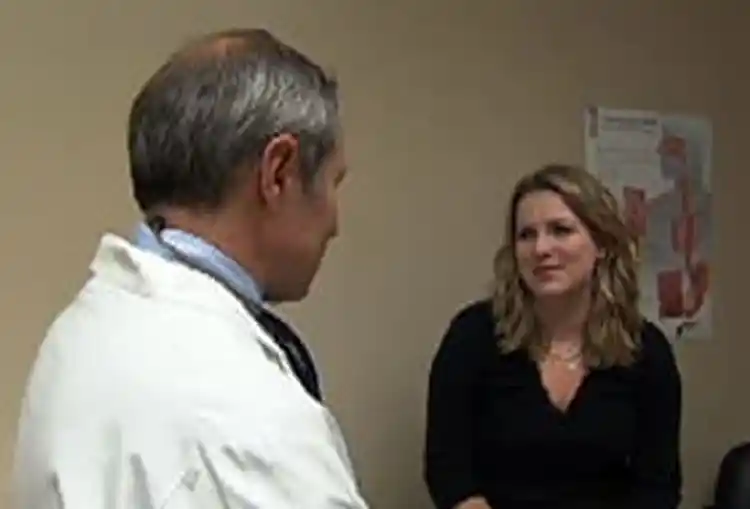Crohn's Disease Treatments

Hide Video Transcript
Video Transcript
Narrator
Doctor Doug Wolf specializes in inflammatory bowel diseases. Douglas Wolf, MD
So how are you doing today, Katie? Katie
I'm feeling a little bit better than I was last week. Narrator
On this day Dr. Wolf is seeing his patient Katie for her Crohn's disease— a type of IBD that can affect the entire digestive tract but is most prevalent in the small intestine or colon… Katie's has had Crohn's since she was ten. Douglas Wolf, MD
People who get Crohn's when they're kids do have more aggressive courses. Narrator
In Crohn's the immune system is believed to have gone array. Douglas Wolf, MD
So there is an immunologic abnormality and there is a dis-regulation of the immune system. Narrator
Currently, that immunologic abnormality can be treated with five different types of medicines: aminosalicylates [AM-EE-NO-SAL-IS-EH-LATES], antibiotics, corticosteroids, immunomoldulators, and the newest class of drugs, biologics… …potent agents, taken either by infusion or injection and that work by targeting the part of the immune system responsible for swelling and ulcerating the gut. They are normally prescribed for moderate to severe cases of Crohn's… Katie
I've seen a great improvement in every area, the side effects are generally much more mild than the other previous treatments I have taken and my overall health has really improved. Narrator
In spite of medical advances, many Crohn's patients will still at some point have to undergo surgery. Such was the case for Katie a few years back when fewer treatment options were available. Katie
I was in the hospital three times in about a six month period…and I ended up having surgery… Narrator
Today there are a handful of biologics approved by the FDA for treatment of Crohn's. In many cases, biologics can be extremely influential in impeding—even reversing-- destruction of the colon. Katie
I feel like overall it's still working for me. I…since we increased my dosage that has made a difference… Narrator
Patients can lose response to these drugs and it's not uncommon to have to adjust dosage or even switch to a different biologic… Katie
I've taken two different biologic drugs and from what I can tell they've kept me mostly in remission…each one has helped for four to five years… Douglas Wolf, MD
If one uses them intermittently, people develop antibodies to them and thereby develop resistance or intolerance to them. These are agents that work best when given continually—on a fixed schedule. Narrator
Patients on biologic drugs require careful monitoring for potential side effects. The most common is injection site-reactions. A vulnerability to infections is also a concern…Katie has weighed the risks and benefits and has opted to continue the treatment… Katie
That's much more appealing to me. To be able to enjoy my life and be healthy and to have less symptoms than I would if I wasn't taking one of them. Narrator
For WebMD, I'm Damon Meharg. 